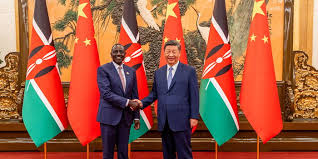By John Thiongo
NAIROBI, Kenya – Kenya’s government has moved to quell speculation over its shifting geopolitical loyalties, firmly rejecting concerns raised by Washington about Nairobi’s growing diplomatic and economic engagement with Beijing.
In a press briefing Monday, Foreign Affairs Principal Secretary Korir Sing’oei stated that Kenya’s foreign policy remained “non-aligned, sovereign, and pragmatic,” adding that closer ties with China were part of a broader strategy to diversify partnerships and accelerate national development.
“We are not pivoting away from any traditional allies,” Sing’oei said. “Kenya is simply broadening its diplomatic and economic horizons in pursuit of mutual benefit. Our relationships are not zero-sum.”
The remarks came days after senior U.S. officials, speaking on background during a diplomatic visit to the region, privately raised concerns over a series of new cooperation agreements between Nairobi and Beijing, including expanded infrastructure financing, digital connectivity initiatives, and increased defense training programs.
Analysts say the United States is increasingly wary of China’s growing footprint in East Africa—particularly in key infrastructure projects such as the Standard Gauge Railway and the Lamu Port-South Sudan-Ethiopia Transport Corridor.
U.S. concerns also stem from recent memorandums of understanding on cyber development, energy, and mining.
But Kenyan officials pushed back against any suggestion of overdependence on China, noting that Nairobi remains a key partner in Western-led initiatives including the Millennium Challenge Corporation, the G7 Just Energy Transition Partnership, and ongoing security cooperation under the African Peace Facility.
“We are a bridge—not a battleground—between great powers,” said Monica Juma, Kenya’s former national security advisor and now a special envoy on strategic partnerships. “Our alignment is with opportunity, not ideology.”
China’s embassy in Nairobi welcomed Kenya’s remarks, reiterating that its engagement is guided by “respect, non-interference, and win-win cooperation.”
U.S. Ambassador Meg Whitman, who has in recent months publicly promoted American investment and values-driven diplomacy in Kenya, declined to comment directly on the concerns but reiterated that “the United States remains a steadfast and trusted partner.”
Diplomatic watchers say Kenya’s assertiveness reflects a broader recalibration across Africa, where countries are seeking more agency amid intensifying competition between global powers.
“This is part of a growing trend,” said Muthoni Wanyeki, a Nairobi-based political analyst. “African states want the freedom to engage globally without being treated as pawns in a great power rivalry.”
As Nairobi deepens its global engagements, the balancing act will remain delicate. For now, officials insist the country is not choosing sides—just choosing growth.





